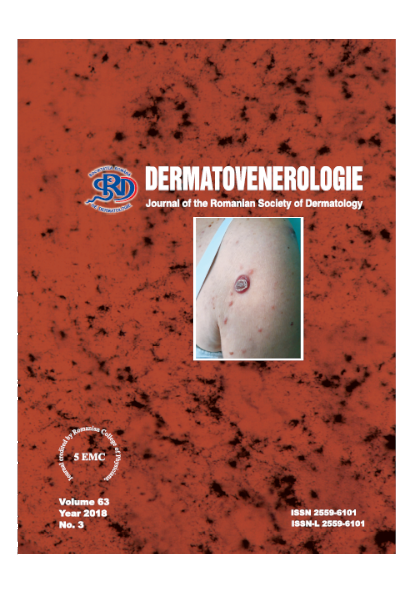Summary
Background: Lichen planus (LP) is a chronic and idiopathic inflammatory disease. The association between lichen planus
and hepatitis or various autoimmune diseases has been reported, but nationwide studies of the relationship of lichen planus with
associated diseases have demonstrated contradicting results.
Objectives: Our study aims to investigate the correlation between lichen planus and associated diseases.
Material and method: Our study was performed on 84 patients diagnosed with lichen planus. Data were obtained from
the ‘Sf. Spiridon’ Clinic of Dermatology, Iasi, Romania from 2015 to 2017.
The study of etiological circumstances was based on anamnesis, general physical examination, clinical form of disease and
interpretation of paraclinical results. The positive diagnosis was based on clinical appearance, subjective symptoms and
histopathological results.
Results: Lichen planus had an incidence of 2% among dermatological conditions. The sex distribution revealed a female
predominance (60,7%). The median age was around 60 years. The prevalence of liver damage in patients with LP was 22,61%,
from which 73,68% had chronic viral infection. Among patients with LP, there were significant associations with autoimmune
thyroiditis, vitiligo, rheumatoid arthritis and alopecia areata. On gender-stratified analyses, the association with autoimmune
diseases was significant only in female patients (94,11%). Most cases with LP and autoimmune diseases have also associated
hepatitis C. In terms of correlation between clinical forms and etiology, eruptive LP was commonly associated with metabolic
disorders, while localised LP was more frequently associated with neuropsychiatric disorders.
Conclusions: Lichen planus is associated with various seemingly unrelated diseases. Physicians who care for patients with
lichen planus should consider screening patients with lichen planus for autoimmune, metabolic and neuropsychiatric disorders.
Regarding the etiology of lichen planus, our study supports the immunological hypothesis.
Original articles
ETIOPATHOGENIC AND CLINICAL CORRELATIONS BETWEEN LICHEN PLANUS AND ASSOCIATED DISEASES


